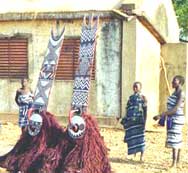
Longer days in Dedougou Hema Cecile is a student in Burkina Fasso, the world’s second poorest country. Thanks to a recent initiative from the World Bank and the International Finance Corporation (IFC) her studies are more productive now.
The launch of Lighting Africa three months ago allowed her (and another thousand households in the town of Dedougou) to swap kerosene lamps for solar- powered lanterns. The LED lights use almost no power, and can keep shining all night if required. That should mean a more productive, better educated, wealthier population — a virtuous circle of reduced energy use and increased economic activity.
Cecile, 23, is in her final year of teaching studies at the University of Ouagadougou and shares a single room with another student in a three-apartment building.
“There is no electricity, and the drinking water is from the local fountain,” she told me in French when we spoke on a mobile phone lent her by a friend.. Her only power is from the solar panel built into her lantern, which she bought for a subsidised price of $20.
Lighting Africa is a $12m, joint IFC and World Bank project to bring lights to the poorest regions across sub-Saharan Africa. The program works with the lighting industry to develop clean, affordable lighting and energy solutions for millions without access to electric grids. Its aim is to accelerate the market and to develop education programs that inform off-grid populations currently dependent on costly, inefficient and hazardous fuel-based lighting about modern alternatives.
Cecile used to spend $3-4 a month on kerosene for her lamp. That is a large proportion of her earnings – like 70% of the population she lives on less than $2 a day. “I can work later at night – its good for my studies, I can read a book,“ said Cecile. In the weeks since she buying her lantern she has managed to read four books including Madame Bovary by Gustave Flaubert and Emile Zola’s Germinale.
She is amongst the most learned in a society which has the world’s lowest literacy rate, according to a 2007 UN Human Development Report. When she graduates next year she will teach in a local Junior school. She makes ends meet by holiday jobs as a cleaner and an IT trainer. To earn her daily ration of cornmeal she does shifts from May to September in a corn field.
Her solar lantern is made and distributed by CB Energie which won an open competition to be awarded the contract. “We have just started to make these lanterns in Burkina Fasso and sold about 3000 so far,” said Arnaud Chabanne a French engineer who founded the company.
The lanterns are designed to look like the kerosene ones they are replacing in order to increase adoption among the population. Each has a small solar panel on the top and costs an average $30, although some cost $100, depending on the size of the battery and the number of LED lights it contains. Because of the large number of sunlight hours in Burkina Fasso, the lamps can be relied on to work whenever needed. The battery life is 2-4 years, and can be replaced once they lose their storage capacity. The LED lights last 5-10 years
Cecile had tried a solar lantern before she was given one by CB Energie, but “it did not last long each night’ she said. “These are better than the Asiatic products,” said Chabanne.
CB Energie has distributed the lanterns to about 7% of the Degadou area’s 15,000 households, and will continue until every needy household has one. “Petrol is expensive,” says Chabanne, “so they can take this money for other things like food, or medicine.”
Although it is hardly out of its trial period the project has already had one unexpected result: “there are fewer people reporting eye problems to the local hospital,” says Chabanne.
One Response
For the past two years we have been developing off the grid lighting package. Iam happy to announce that our lighting pakage is now on the market.please take a look at our websight. I believe our product is just what you are looking for.Thank you for your time,Jerry